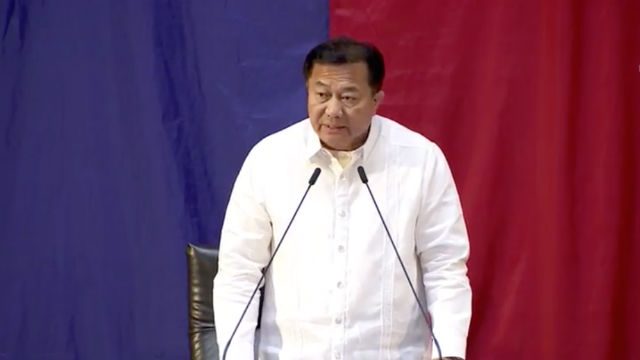SUMMARY
This is AI generated summarization, which may have errors. For context, always refer to the full article.

MANILA, Philippines – Speaker Pantaleon Alvarez said on Wednesday, January 3, that he is open to the cancellation of the 2019 mid-term elections if the country transitions to a federal form of government.
In an interview with Karen Davila on ANC’s Headstart, Alvarez said convening Congress into a Constituent Assembly (Con-Ass) that would work on revisions to the Constitution and ultimately, a shift to a federal form of government, would be the House’s top priority.
He said that after the constitutional amendments are ironed out and a plebiscite is held, one of the possible outcomes is the cancellation of the mid-term elections scheduled in May 2019.
Asked about the possibility of legislators pushing for the cancellation of mid-term elections, Alvarez said, “It depends, if that’s what ends up in the transitory provision.”
He added: “Remember, the senators have terms that expire at different years….some terms will expire in 2019, some in 2022. In fairness, it might be better if you let all those terms expire in 2022, so there’s no term left behind. All terms expire.”
In the Philippines, senators are elected to 6-year terms with different starting years – 12 senators, for instance, were elected in 2016 with terms that expire in 2022. The rest were elected in 2013 with terms that expire in 2019.
House members, meanwhile, have 3-year terms and are elected every 3 years.
Senate President Aquilino Pimentel III, PDP-Laban president, was less welcoming to the cancellation of the 2019 elections.
“That is not an ‘either or’ situation. We can shift to federalism and allow all scheduled elections under the existing Constitution to go on and be held,” Pimentel said.
Pimentel, who is seeking reelection in 2019, said that before the country can move on to a new Constitution, the provisions of the 1987 Constitution should be followed.
“If there are scheduled elections under the existing Constitution, then this must be followed,” he said.
In Alvarez’s ANC interview, he said the plan is to convene the Con-Ass by January 2018. Congress resumes session on January 15. The House began deliberations before plenary on a Con-Ass before it went on break in December 2017.
“PDP-Laban, as a party, its advocacy is federalism. So I don’t see any reason why the Senate President [Koko] Pimentel would not work on it also,” Alvarez said, when asked about Pimentel and other senators’ apparent silence over the shift to federalism.
‘There are ways’
Alvarez seemed bullish over the prospects of federalism, particularly in Congress, despite the senators’ apparent silence and the short timetable they have.
“If you work on it, nothing is possible. You will be able to do it,” said Alvarez, when asked about his January 2018 target.
Alvarez is also targeting a plebiscite by May 2018, alongside the Sangguniang Kabataan and barangay elections.
The Speaker, who is also PDP-Laban secretary general, defended legislators from insinuations that they have “vested interest” in the shift to a new form of government, particularly given the promise of possible term extensions.
“You know, it’s only incidental. That’s nothing to us. If we have an election in 2019, that’s not a problem. But let’s be practical, what’s our objective? It’s to shift to a federal form of government, change our structure of government, create a [federal] state. In each state, you elect a governor but we still don’t know the setup. Will there be provinces, municipalities, cities? We still don’t know,” he said.
Citing deliberations at the House, Alvarez said there was “consensus” that under a new form of government, the Philippines will still elect a president who will be the head of state. The prime minister will be the head of government. – Rappler.com
Add a comment
How does this make you feel?
There are no comments yet. Add your comment to start the conversation.